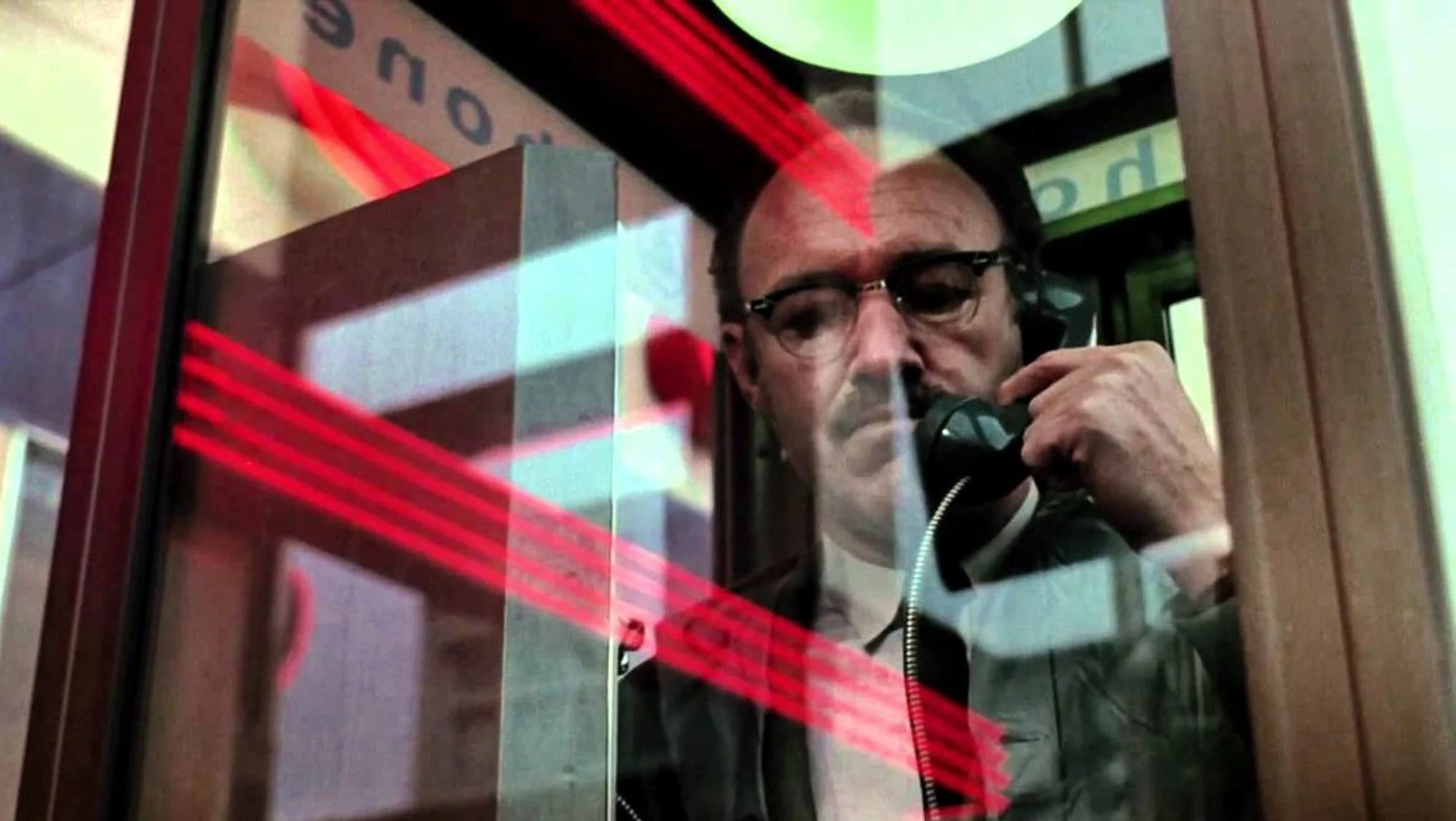Gene Hackman in his greatest role, 1974’s The Conversation.
Fifty years of The Conversation
Gene Hackman crashes into the strange and shattering experience of listening. Hard.
By Craig Colgan
April 7, 2024
colganwrites.com
WASHINGTON – A video from China made its way across X recently showing a man wandering outdoor cafes holding what looked like a smartphone up to the faces of everyone he came across. He would then nod and move on. The point is to show, apparently, that this is one way a vast surveillance state works: If the social credit database reveals that you are allowed a night out, then relax and enjoy your Tsingtao. The human drone holding up the phone has zero interest in his targets, of course. He is doing a job. But what might happen if he suddenly did concern himself, even briefly, with the potential consequences of such work? Francis Coppola wrestled with that question in his intensely perceptive and harshly specific The Conversation. Which nails the real problem and even describes a solution. Marking the 50th anniversary of its release this month, this involving exploration brings present-day relevance, a satisfying lead performance and an encompassing mystery. Which is more than enough. Then the viewer experience morphs, when our hero confronts the undeniable strangeness and shattering impact of the act of listening. Then everything veers off. And the game is on.
The veering really is more of a merging, as Coppola is aiming toward a lane next to us all along. Gene Hackman plays Harry Caul, who records people for a living. Rich clients hire his clandestine team of gloriously analog geeks for serious audio intelligence gathering against corporate competitors, who are developing a next-gen product or planning some secret strategy. Or sometimes for matters more carnal. A jealous and apparently very powerful executive (Robert Duval) hires Harry’s pack to follow and record the executive’s wife. Is she having an affair? Spurred by a conversation Harry’s team recorded that Harry strains to decode and magnify, which references for Harry a terrible moment in his past, he makes the choice to delve further. When he would normally avoid concerning himself in any way with details from the lives of his recorded subjects. His job is to engineer, plot, map, manage the surveillance job, edit the tapes recorded from multiple locations, before handing over an assembled final version. Then walk away with an envelope full of cash. But for some reason, Harry listens this time. Close. Is something else going on? Harry hunts for meaning and intention and who is moral and who is evil.
All as the vaguely mysterious organization that hired him seems ever-present, causing constant confusion for Harry. Who strains and processes and engineers his recordings, from his warehouse workshop, behind a locked cage. Of course. Sadly, when the shattering answer emerges, and the threat seems to be clear, it is way past too late. Harry is not the target. But it’s too late for him, too.
References to the historical moment are frequent. Coppola and editor Walter Murch seem fascinated with the act of covert recording itself. Long directional microphones like rifles are aimed out of windows high up in office buildings, adding to the film’s assassination vibe. Harry’s final product handed to the client is constructed from several recordings, of the same conversation, some requiring risky up-close contact. Others are stolen from great distance. Because trusting a single version of a conversation will not be enough to lead us to the truth. In the third act that worldview gets destructed, because even after assembling multiple recordings into a pristine final product, something is missed. Did Harry get it wrong? Should he have assigned yet another operative, concealing a microphone hidden in a shopping bag, to furtively wander alongside the chatty subject and her boyfriend as they circle through a San Francisco park? Soon, it is clear that Harry’s entire stealth, ordered, locked-up frozen life – professional and personal – is at stake. Work for a previous client resulted in tragedy. He is determined to avoid a repeat. But Harry has little experience asking himself the necessary questions. The money is good. The acclaim across his field is continuous. And Harry’s very arranged life has no room for such excavations.
Is a murder ahead? Or is this evil still hidden? Coppola does it better here than various higher profile pictures of the 1970s treading similar ground, such as The Parallax View with Warren Beatty and Three Days of the Condor with Robert Redford. Neither of which can avoid movie clichés, dumb bad guys or awkward tropes. Coppola has Hackman, in his greatest performance, and that really is enough, though the supporting cast is committed. Cindy Williams, Harrison Ford, John Cazale and the fabulous Allen Garfield seem to have wandered over from multiple significant movies of the era, more than a few confronting similar menace and threat.
Essential moments are revealed via several detailed and absorbing set-pieces, that work as rewarding, condensed stage plays. Including a long sequence at an impromptu party at Harry’s warehouse workshop. Where he is celebrated in front of his peers, then taken down by a competitor. The point of all this is Harry’s invincibility is fraying. He has already begun a process where he for the first time considers the consequences of his work. Harry’s sudden protective instinct about the people he bugs, instead of simply completing his assignment for pay, is very new to him. It elevates then threatens to annihilate him. Hackman, fresh off the more conventional and louder hit The French Connection, shows us this time a lonely but accomplished man, who relies on technology to arrange a life that is predictable and protected and secure. It works just fine. Until he starts really listening.
Craig Colgan is a Washington, D.C.-based writer.
©2024 Craig Colgan • ColganWrites.com
